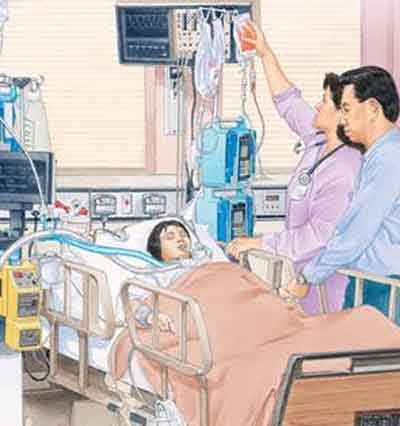- Home
- Editorial
- News
- Practice Guidelines
- Anesthesiology Guidelines
- Cancer Guidelines
- Cardiac Sciences Guidelines
- Critical Care Guidelines
- Dentistry Guidelines
- Dermatology Guidelines
- Diabetes and Endo Guidelines
- Diagnostics Guidelines
- ENT Guidelines
- Featured Practice Guidelines
- Gastroenterology Guidelines
- Geriatrics Guidelines
- Medicine Guidelines
- Nephrology Guidelines
- Neurosciences Guidelines
- Obs and Gynae Guidelines
- Ophthalmology Guidelines
- Orthopaedics Guidelines
- Paediatrics Guidelines
- Psychiatry Guidelines
- Pulmonology Guidelines
- Radiology Guidelines
- Surgery Guidelines
- Urology Guidelines
New guidelines on Critical Care released

Critical illness is a stressful and traumatic experience that may have lasting effects on the health of patients and families, even months after discharge from the intensive care unit (ICU). A new set of guidelines for promoting family-centered care in neonatal, pediatric, and adult ICUs will be presented at the Society of Critical Care Medicine's (SCCM) 46th Critical Care Congress, to be held January 21 to 25, 2017, at the Hawaii Convention Center, Honolulu. The guidelines also appear in Critical Care Medicine, SCCM's official journal, published by Wolters Kluwer.
"These guidelines identify the evidence base for best practices for family-centered care in the ICU," comments lead author Judy E. Davidson, DNP, RN, FAAN, FCCM, of the University of California San Diego Health. The new guidelines are based on evidence showing that family-centered care may prevent or lessen the impact of post-intensive care syndrome lingering physical and mental health effects that can occur in family members as well as patients. The guidelines and supporting work tools are now available on the SCCM and Critical Care Medicine websites.
Family-Centered Care in the ICU: Evidence and Recommendations
Based on analysis of more than 450 qualitative and quantitative studies, a multidisciplinary international expert panel developed a series of evidence-based recommendations for family-centered care in the ICU. Defined as "an approach to healthcare that is respectful of and responsive to individual families' needs and values," family-centered care recognizes the central importance of the family to the patient's recovery.
The expert panel followed a rigorous, objective, and transparent approach to evidence analysis, including steps to incorporate the perspectives of former ICU patients and family members. Examples of the 23 recommendations, grouped into five areas, include:
- Family presence in the ICU. "Open or flexible" family presence in the ICU, along with support and positive reinforcement for staff in partnership with families.
- Family support. Family education and instruction on how to assist with care.
- Communication with family members. Family conferences to promote communication and trust between family members and clinicians and lower the risks of anxiety, depression, and posttraumatic stress symptoms.
- Specific consultations and ICU team members. Palliative and ethics consultations, as well as the roles of psychologists, social workers, family navigators, and spiritual advisors.
- Operational and environmental issues. Policies and procedures to support family-centered care, for example, considering space for family members to sleep.
The report includes a summary of the supporting evidence for each recommendation. The expert panel highlights areas for further research to strengthen the evidence base." One of the key findings from these guidelines is that there are many important areas of family-centered care where the evidence-base is inadequate. The guidelines highlight key areas for future research," comments senior author J. Randall Curtis, MD, MPH, of the University of Washington, Seattle. The guidelines have been endorsed by nine leading critical care and family-centered care specialty organizations in North America and Europe
The panel, in collaboration with a task force led by David Y. Hwang MD, of Yale University, has also developed a guide to help in planning and implementing steps to improve family-centered care in ICU settings. This document lists tested resources for translating the recommendations into practice. A gap analysis tool was also developed for use in developing hospital-specific priorities for change to enhance family-centered care. This video offers instruction on how to use the gap analysis tool.

Disclaimer: This site is primarily intended for healthcare professionals. Any content/information on this website does not replace the advice of medical and/or health professionals and should not be construed as medical/diagnostic advice/endorsement or prescription. Use of this site is subject to our terms of use, privacy policy, advertisement policy. © 2020 Minerva Medical Treatment Pvt Ltd